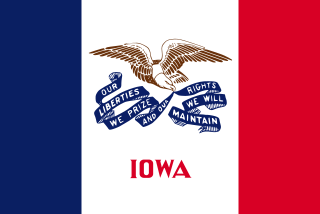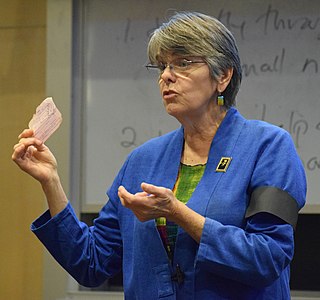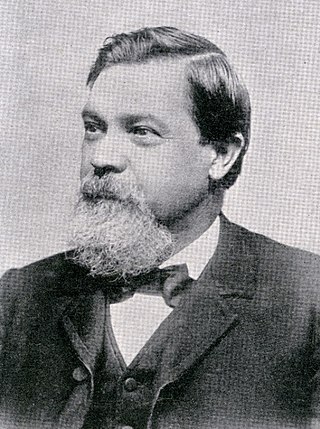
Over 50 million Americans claim German ancestry, which made them the largest single claimed ancestry group in the United States until 2020. Around 1.06 million people in the United States speak the German language at home. It is the second most spoken language in North Dakota and is the third most spoken language in 16 other states.
Frederick Wilhelm Kaltenbach was an American of German ancestry who broadcast Nazi propaganda from Germany during World War II.

Anti-German sentiment is fear or dislike of Germany, its people, and its culture. Its opposite is Germanophilia.
Meyer v. Nebraska, 262 U.S. 390 (1923), was a landmark decision by the United States Supreme Court that held that the "Siman Act", a 1919 Nebraska law prohibiting minority languages as both the subject and medium of instruction in schools, violated the Due Process Clause of the Fourteenth Amendment to the United States Constitution. The Court's ruling is one of the earliest articulations of substantive due process.

William Lloyd Harding was an American Republican politician. He was the 22nd Governor of Iowa, from 1917 to 1921.
The Iowa State Council for Defense was created by Iowa Governor William L. Harding one month after the United States entered World War I, and was disbanded soon after the end of the war. It became a focal point of various political battles conducted in the name of loyalty and Americanism.

Pella Dutch, also known as Iowa Dutch, is a dialect of the Dutch language spoken in Pella, Iowa.

Lester Jesse Dickinson was a Republican United States Representative and Senator from Iowa. He was, in the words of Time magazine, "a big, friendly, white-thatched Iowa lawyer." In early 1936, he dreamed of winning the presidency. However, the only race he would enter that year would be for his own seat in the Senate which he lost.

The state of Iowa played a significant role during the American Civil War in providing food, supplies, troops and officers for the Union army.
Nativism is the political policy of promoting or protecting the interests of native-born or indigenous people over those of immigrants, including the support of anti-immigration and immigration-restriction measures.

Kimberly Kay Reynolds is an American politician serving as the 43rd governor of Iowa since 2017. A member of the Republican Party, she served as the 46th lieutenant governor of Iowa from 2011 to 2017.

Iowa is a state in the upper Midwestern region of the United States. It borders the Mississippi River to the east and the Missouri River and Big Sioux River to the west; Wisconsin to the northeast, Illinois to the east and southeast, Missouri to the south, Nebraska to the west, South Dakota to the northwest, and Minnesota to the north.

Lesbian, gay, bisexual transgender, and queer (LGBTQ) rights in the U.S. state of Iowa have evolved significantly in the 21st century. Iowa began issuing marriage licenses to same-sex couples on April 27, 2009 following a ruling by the Iowa Supreme Court, making Iowa the fourth U.S. state to legalize same-sex marriage. Same-sex couples may also adopt, and state laws ban discrimination based on sexual orientation or gender identity in employment, housing and public accommodations.
The Northern Iowan is a student newspaper at the University of Northern Iowa. It is published weekly, on Wednesday and distributed around campus, College Hill, and downtown Cedar Falls free of charge. The paper publishes articles on campus news and events, the university's sports programs, and student opinion pieces. The name of the paper has changed over the years. It was called the Students Offering from 1888–1889, the Normal Eye from 1892–1911, the College Eye from 1911–1967, and the Northern Iowan from 1967–present.

Mary Beth Tinker is an American free speech activist known for her role in the 1969 Tinker v. Des Moines Independent Community School District Supreme Court case, which ruled that Warren Harding Junior High School could not punish her for wearing a black armband in school in support of a truce in the Vietnam War. The case set a precedent for student speech in schools.
Capital punishment has been abolished in Iowa since 1965. Forty-five men were executed by hanging in Iowa between 1834 and 1963 for crimes including murder, rape, and robbery.
Abortion in Iowa is illegal after detection of embryonic cardiac-cell activity. Embryonic cardiac-cell activity can be detected from around six weeks after the pregnant individual's last menstrual period, when many people are not yet aware that they are pregnant. Exceptions for the abortion ban after detected embryonic cardiac-cell activity include some instances of rape, incest, fetal abnormalities and threats to the pregnant individual's life.

The COVID-19 pandemic was confirmed to have reached the U.S. state of Iowa in March 2020. The first known cases were three individuals who had traveled on a cruise in Egypt before returning home to Johnson County on March 3. Initially, case clusters were focused at meatpacking plants and congregate care facilities. By late October, community spread had become a concern, and some areas of the state had reported over 20% test positivity. A headline stated that "Iowa hospitals fear overwhelming patient surge if coronavirus cases continue to climb."

Joseph Eiboeck was an American newspaper editor, publisher, and author, who emigrated from the Austrian Empire to the United States. Known as "Colonel Eiboeck", he was one of the most prominent newspaper editors in late 19th- and early 20th-century Iowa, writing in both German and English, and an influential opponent of Prohibition. For nearly 40 years, he edited the Iowa Staats-Anzeiger, a Des Moines newspaper focusing on state politics and advocating "personal liberty", the motto of anti-Prohibitionists. Although Eiboeck himself did not drink alcohol, he believed in individual choice over regulation, and campaigned fervently against anti-saloon legislation, representing "the extreme views of the liquor interests in Iowa politics" according to The New York Times.
The ideology of nativism—favoring native inhabitants, as opposed to immigrants—has been very common and contentious within American politics for centuries. Nativist movements have been around since even before American independence, and have targeted a wide variety of nationalities. Historically, nativism was present even in colonial America. During that era, anti-German feelings, particularly towards the Pennsylvania Dutch, ran deep. Later on, when the U.S. became its own nation, the Federalist Party expressed opposition to the French Revolution, and also passed the 1798 anti-immigrant Alien and Sedition Acts. When immigration rates to the nation exploded in the 1840s and 1850s, nativism ran with a renewed fervor, with the word nativism itself coined by 1844, and the formation of the Know Nothing Party.












